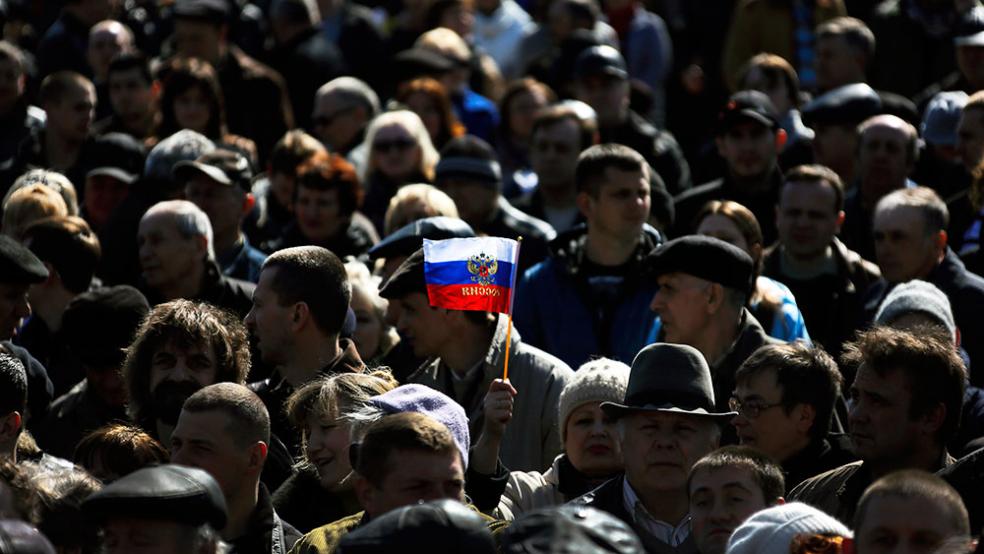From the outset, it was clear that the only way to check Vladimir Putin’s ambitions in Eastern Europe was to starve the country economically, taking money out of the pockets of the oligarchs who back the Russian president. Putin then would be forced to act more reasonably so that Russian businesses could continue to do trade with the rest of the world.
That plan appears to be working, since Putin is running out of options to save the Russian economy.
Related: Bond Markets Put the Squeeze on Putin
For the seventh time in eight weeks, Russia has been forced to cancel a sale of some 10 billion rubles ($280 million), of nine-year ruble securities and the same amount of five-year notes. The reason for the failed auctions is simple: Russia could not sell the securities at a low enough yield to make the sale practical.
Investors view Russian bonds as so risky that they refuse to pay for them at a price that makes the deal a good one for Russia. Yields on Russian bonds have spiked dramatically since Putin invaded Crimea on March first, rising 80 basis points, or 8 percent. (For a more thorough look at Russian bond prices since the Crimea invasion, read Rob Garver’s story here.)
The dismal response to yesterday’s bond auction was a direct reaction to comments made by Secretary of State John Kerry Tuesday. During a call with Russian Foreign Minister Sergei Lavrov, Kerry expressed concern “over the lack of positive Russian steps to de-escalate.” This led to the failed auction.
Related: Pressure on Putin As Russian Wealth Disappears
The failure shows that Russia’s options are running out. Its economy has been hammered since the start of the Ukraine crisis; the Russian economy was expected to grow 2.5 percent in the first quarter, but expanded just 0.8 percent, according to Economic Minister Alexei Ulyukayev. He told the Russian parliament earlier this month that the slow growth was due to the “acute international situation of the past two months" and "serious capital flight.”
At the same time, the Russian stock market has nosedived since the Ukraine crisis began, putting the squeeze on Russian businesses. New sanctions threatened by the United States and Europe would likely target specific sectors, like energy, hurting these companies more. Edward Goldberg, a professor at Baruch College and the New York University Center for Global Affairs, says Putin has refused to acknowledge the connections between the Russian and global economies.
“The world is economically integrated and globalized. This has radically altered the game of major state aggression,” he said. “All in all the Crimea invasion is pushing the Russian economy into a very difficult space; a space usually occupied by countries with huge imbalances on their current account balances that are awaiting the IMF to bail them out.”
Related: Why Putin's Adventure in Ukraine Is Doomed
Russia’s old safety valve -- oil -- is not the reliable backstop it once was. Energy prices have flattened in recent years, making Russia’s vast oil and gas reserves less valuable.
But the real key is Europe. The Europeans are in a position where they don’t need Russian energy. A mild winter and a warming spring have allowed them to cut their dependence on Russian energy and stock their reserves. They could put sanctions against Russian energy in place without seriously affecting the European economy.
With European gas dollars in doubt, the state-owned energy giant Gazprom is rushing to finish an export deal with China, potentially opening a new market that would wean Russia off euros.
“Judging by the speed of work which is under way in Gazprom, I would say the possibility that the deal would be signed is 98 percent," a Gazprom source told Reuters.
Related: How Europe Could Finally Call Putin's Bluff
A new report from the Oxford Institute for Energy Studies stressed the urgency of the deal. This is why Gazprom has already agreed to steep price concessions.
“If it is agreed, the impact on China’s domestic gas market, and on regional and global trading, will be substantial and well beyond previous expectations,” the institute wrote in its February 2014 quarterly report. “If there is no deal, Russia will have a hard time carving out a lucrative slice of the Asian gas market in coming years.”
Without this deal, Russia is also likely to have a hard time sustaining its economy. Putin has been able to continue his adventures in Ukraine because he remains popular with the Russian people. But the only people who matter are the oligarchs, who are losing money hand-over-fist. If they’re unhappy, Putin’s adventures might be short-lived.
Top Reads from The Fiscal Times
- We’re One Step Closer to Robots on the Battlefield
- America’s Ugly Win in Afghanistan
- Sexting and Drunk Driving Lead to Job Security at VA





